Related Research Articles
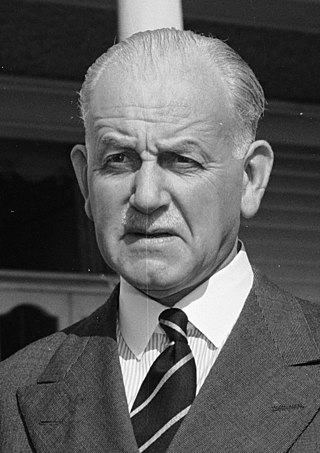
Lieutenant-General Charles Willoughby Moke Norrie, 1st Baron Norrie,, was a senior officer of the British Army who fought in both World Wars, following which he served terms as Governor of South Australia and the eighth Governor-General of New Zealand.
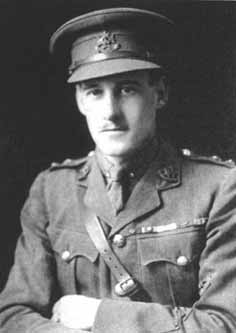
Brigadier Charles Edward Hudson, was a British Army officer and an English recipient of the Victoria Cross (VC), the highest award for gallantry in the face of the enemy that can be awarded to British and Commonwealth forces.
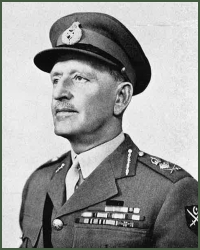
General Sir Douglas David Gracey & Bar was a British Indian Army officer who fought in both the First and Second World Wars. He also fought in French Indochina and was the second Commander-in-Chief of the Pakistan Army. Gracey held this latter office from 11 February 1948 until his retirement on 16 January 1951. Born to English parents living in India, he was educated in English schools before returning to India to serve in the military there.
Lieutenant General Noel Mackintosh Stuart Irwin & Two Bars, MC was a senior British Army officer, who played a prominent role in the British Army after the Dunkirk evacuation, and in the Burma campaign during the Second World War. He was also instrumental in some reforms to the training and equipment of British soldiers after the defeat in France in 1940, intended to meet the demands of modern warfare.
Major-General Sir Stuart Greeves and Bar, was a British Indian Army officer. He served in World War I and World War II.
Lieutenant General Arthur Nugent Floyer-Acland, was a senior officer of the British Army who served in both the First and Second World Wars. He was Military Secretary from 1940 to 1942. In later life, he was High Sheriff and Deputy Lieutenant of Dorset.
Donald Powell Distinguished Service Order was an officer in the British Indian Army during World War I and World War II
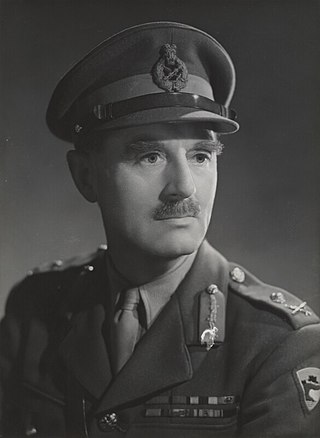
Major-General Eric Grant Miles CB DSO MC was a senior British Army officer who saw active service during both World War I and World War II, where he commanded the 126th Infantry Brigade in the Battle of France and the 56th (London) Infantry Division in the final stages of the campaign in Tunisia.
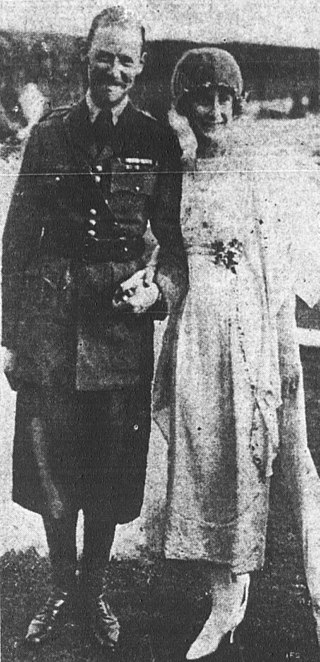
Major-General Sir John Charles Oakes Marriott, was a senior British Army officer who served during the First World War and again in the Second World War.

Major-General Charles John Sackville-West, 4th Baron Sackville, was a British Army general and peer who served throughout the First World War and reached the rank of major general. In 1919, he was British Military Representative on the Supreme War Council and from 1920 to 1924 he was military attaché in Paris. He inherited his title on 28 January 1928 on the death of his brother, Lionel Edward Sackville-West, 3rd Baron Sackville. He served as Lieutenant Governor of Guernsey.
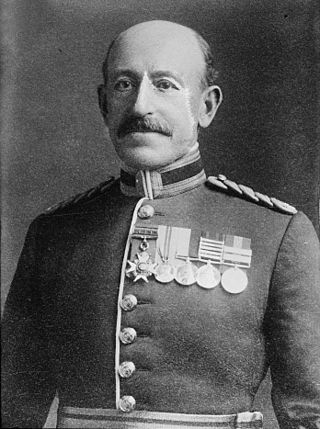
Major-General Herman James Shelley Landon,, , was a British Army officer. During the Boer War he commanded a battalion, and was promoted in the interwar period to take command of a brigade in the British Expeditionary Force. He commanded the brigade during the early fighting on the Western Front in the First World War, and succeeded to the command of 1st Infantry Division when his commanding officer was killed at the First Battle of Ypres; he later commanded four more New Army divisions during the war.

General Sir Henry Charles Loyd,, nicknamed "Budget Loyd", was a senior British Army officer who fought in both the world wars, most notably during the Second World War as General Officer Commanding (GOC) of the 2nd Infantry Division during the Battle of France in May 1940.

General Sir Thomas Sheridan Riddell-Webster was Quartermaster-General to the Forces during the Second World War.
Major-General Edward Douglas Loch, 2nd Baron Loch was a senior British Army officer and peer.

Major General Henry Newport Charles Heath was a British Army general during the First World War, who commanded the 48th Division from 1914 to 1915.

Major General Eric Clive Pegus Plant, was an officer in the Australian Army who served during the First and Second World Wars. Plant served in the pre-war part-time military from 1908, before joining the permanent forces in 1912. During the First World War, he volunteered for the First Australian Imperial Force and served at Gallipoli in 1915 as the adjutant of an infantry battalion. Later, he served as a staff officer at both brigade and divisional levels on the Western Front between 1916 and 1918, reaching the rank of lieutenant colonel.
Lieutenant-General Sir William Henry Goldney Baker was a British officer who served in the British Indian Army. Commissioned into the Indian Army in 1910, he served in France during World War I with the 34th Poona Horse and later the Cheshire Regiment, of which he was temporary commander of the 1st Battalion. Baker was mentioned in dispatches three times and awarded the Distinguished Service Order. In 1918 he fought the Marris in India with the 31st Duke of Connaught's Own Lancers. He then held a series of staff officer positions after the war before being promoted to lieutenant-colonel and receiving command of Probyn's Horse in 1935. He was promoted to the temporary rank of brigadier and commanded troops in action in Waziristan in 1936 and 1937, being again mentioned in dispatches. During World War II Baker was an aide-de-camp to King George VI and was promoted to the rank of lieutenant-general before retiring from military service in 1944.
Brigadier-General Francis Stewart Montague-Bates,, (1876–1954) was a British Army officer in the early part of the 20th century, seeing active service in the Second Boer War, the First World War, the Occupation of Constantinople, the Anglo-Irish War, and the Second World War.
Major General John Hedley Thornton Priestman, was a senior officer in the British Army.

Major General Gervase Thorpe, was a senior officer in the British Army.
References
- 1 2 Smart 2005, p. 217.
- ↑ Dix Noonan Webb auction catalogue September 19, 2013
- ↑ Military records and relevant gazette copies